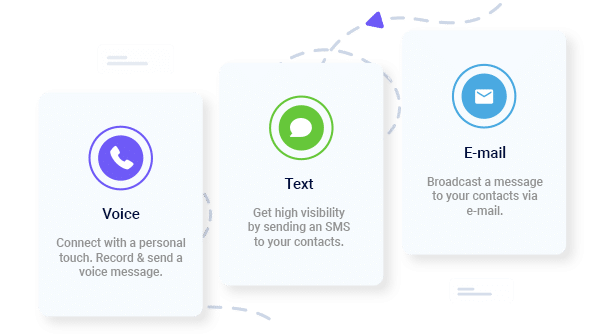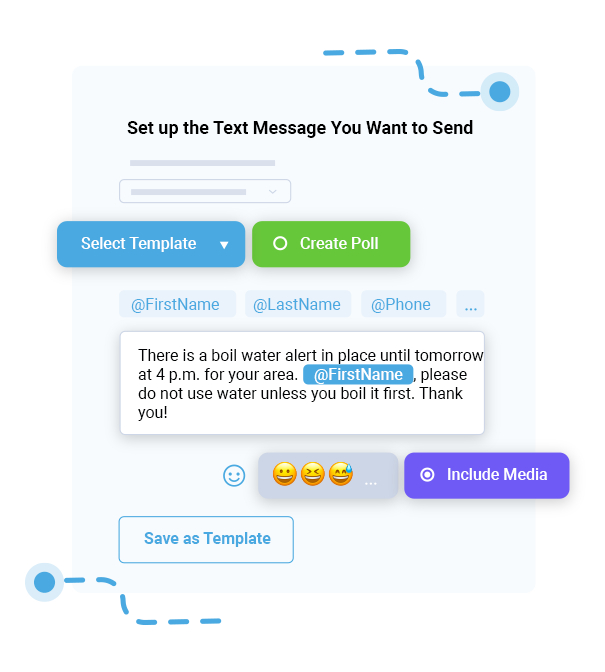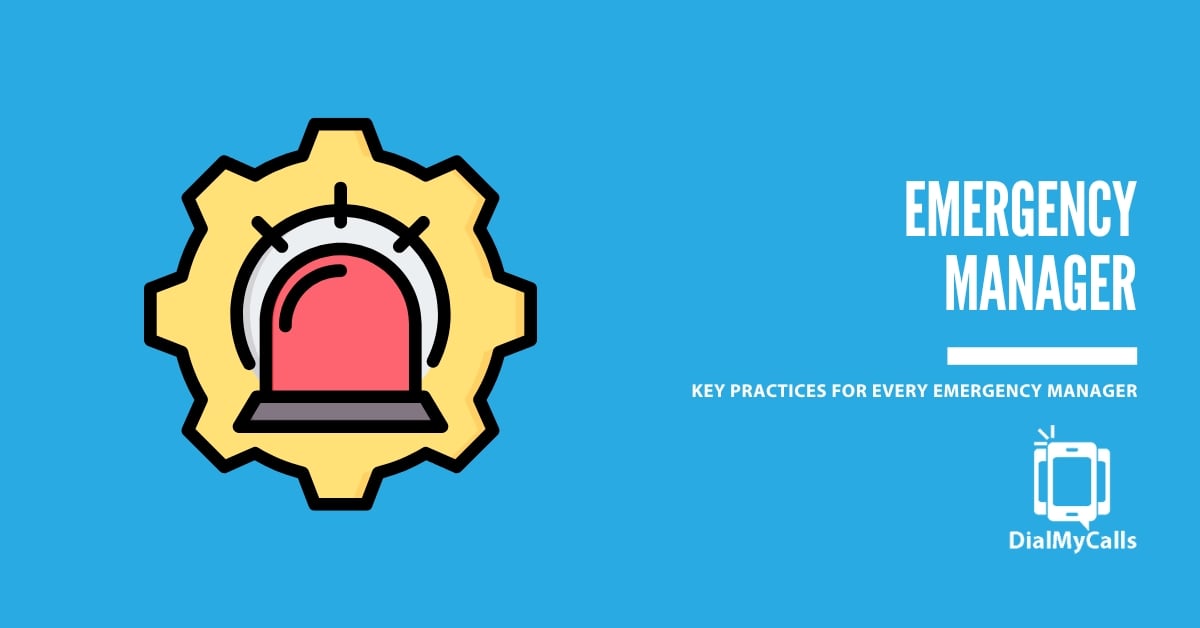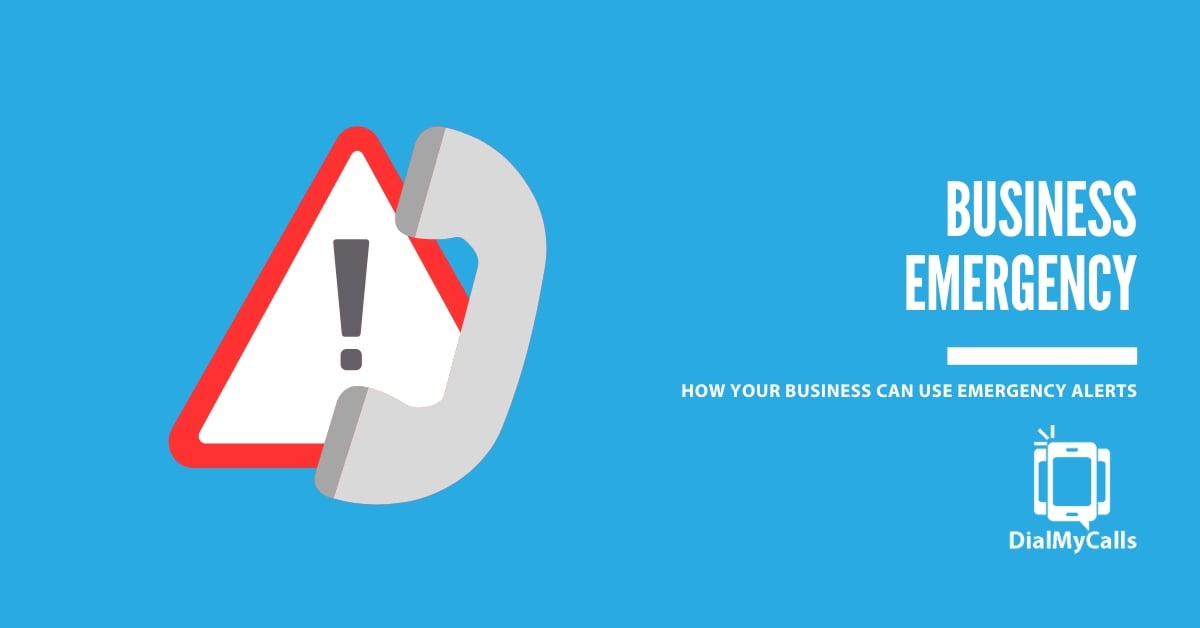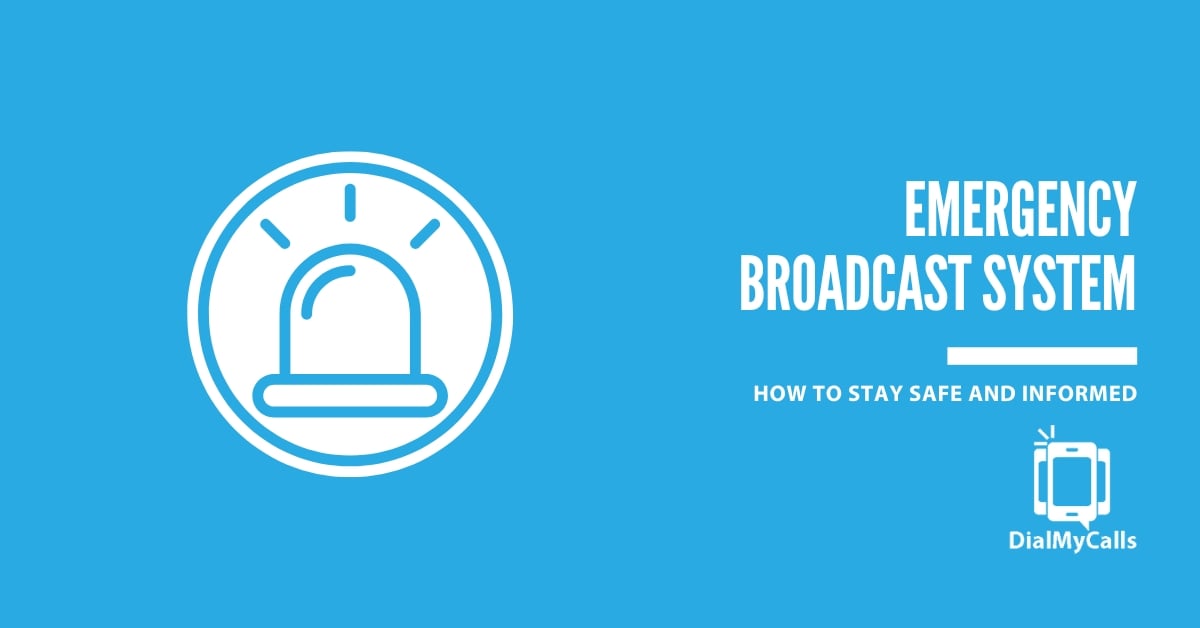Author

Ryan Betancur is an Emergency Management Planner at Hagerty Consulting and a proud US Army veteran. Drawing on years of experience, he specializes in healthcare and critical infrastructure emergency management, strategic planning, and business continuity. Ryan has been on the front lines managing COVID-19 responses in New Jersey and Illinois and supporting NYC's Migrant Crisis response. He holds a master's degree in Homeland Security and Emergency Management and multiple certifications in emergency preparedness.
Try Using DialMyCalls Right Now
Start For FreeRecent Posts
- 10 Proven Tips To Rapidly Grow Your SMS Subscriber List
- SMS Marketing Metrics: How to Measure and Improve Your Text Campaign’s Success
- What are SMS Carrier Fees and How to Lower Your Costs
- 8 Creative SMS Marketing Ideas to Boost Engagement This Summer
- 15 Ways to Use QR Codes For Event Promotion & Attendee Engagement
Categories
“I am a youth minister and have spent hours in the past calling students individually to remind them of an upcoming event or to get out an urgent announcement. With DialMyCalls.com, I cut that time down to about 1 minute. I also love how I can see exactly who answered live and how long they listened so I know if they heard the whole message. DialMyCalls.com is the best website I have stumbled upon all year! Thanks!”
Central Baptist Church
Try Using DialMyCalls Right Now
Start For Free6 Key Steps to Safeguard Employees & Customers During a Boil Water Alert
Posted by Ryan Betancur in Emergency Notification on November 15, 2024
Updated on January 22, 2025
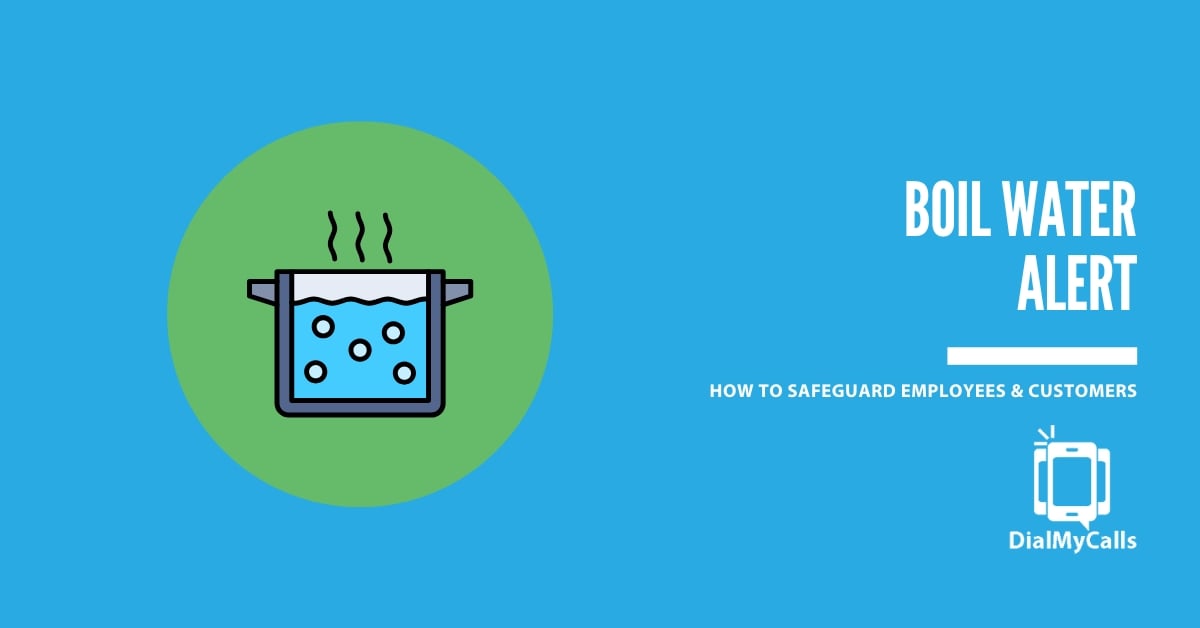
If you were asked to name the innovations that had the greatest impact on modern society, what would you list? Chances are good you’d name electricity, maybe the internal combustion engine, and probably modern agriculture.
However, that ignores one of the key developments that make modern life what it is: access to a readily available supply of fresh, clean water for drinking, cooking, and bathing.
Think about it. With the push of a button, you can have a stream of fresh water at the office drinking fountain. A twist of the handle and you can wash your hands in the bathroom sink. All across America, people access this incredible resource every day and think almost nothing of it.
The truth is that if something were to happen to your water supply, your life would change pretty quickly. And while we might take it for granted, disruptions to our water supply can happen at any time.
It takes surprisingly little to compromise your water quality. And then you’ll find yourself forced to boil water before it can be safely used. Boil water alerts can last for hours, days, or even weeks in some instances.
Stay Connected with Mass Notifications
Create & Send a Broadcast to Thousands in Seconds
For businesses, these alerts aren’t just inconveniences. They pose real risks to employee and customer health and can disrupt daily operations. This guide will walk you through the essential steps to protect everyone on your premises during a boil water alert and keep your business running smoothly.
What Is a Boil Water Alert & Why It Matters for Businesses?
A water boil alert is an official warning from health authorities notifying the public that tap water could be contaminated and must be boiled before use. Contamination may lead to serious health issues, particularly gastrointestinal problems if the water is consumed or used improperly.
All across America, local authorities issue boil water alerts daily. For instance, Newsweek created an interactive map showing boil water alerts issued in the US on July 10, 2024. Those included:
- Illinois – A high-pressure water main break led to a boil water alert for three areas around Chicago.
- Kansas – A waterline break led to a loss of pressure and potential bacterial problems for customers throughout Cloud County.
- Michigan – All of Sylvan Township was under a boil water alert after a security breach at the local water treatment plant where a single individual broke in and damaged equipment.
- Texas – Hurricane Beryl’s arrival brought major flooding, requiring all customers in and around Houston to boil their water before use.
According to the CDC, these alerts can be issued for:
- Chemicals, like arsenic
- Toxins, like those stemming from algal blooms
- Radioactive materials
- Germs, like Shigella
Note that the CDC also breaks water-related alerts down into three categories. These include boil water advisories, which require you to boil tap water before using it, do not drink water advisories, which tell you to use bottled water for cooking and drinking but allow tap water for washing your hands, and do no use water advisories, telling you to avoid tap water in all cases even if it’s boiled first.
Boil water alerts have a dramatic effect on residents in these areas. However, they also impact businesses like yours.
Why Does This Matter for Businesses?
Whether you run a restaurant, hotel, office, or healthcare facility, contaminated water can affect everything—from the safety of your food and beverages to basic hygiene practices like hand washing.
Not sure what to be aware of during these instances? The steps below explain what you need to do to safeguard both your people and your operations during a boil water alert.
Identify the Risks: Common Impacts of Contaminated Water
- Health Risks
- Operational Risks
- Daily Activity Disruptions
Understanding the impact of a water boil alert on your business can help you act quickly and effectively. Here are the primary risks to bear in mind:
Health Risks
Consuming or using contaminated water can lead to gastrointestinal illness, skin infections, and, in severe cases, long-term health complications. This can put your employees and customers at risk if they drink, wash, or prepare food with tap water during an alert.
Operational Risks
Boil water alerts disrupt businesses that rely on clean water for operations. Restaurants, hotels, hospitals, and manufacturing facilities are just some examples of businesses that face challenges in ensuring safe food, clean restrooms, and sanitary workspaces.
Daily Activity Disruptions
Beyond the obvious drinking water concerns, a boil water alert impacts food preparation, cleaning, and even hand washing routines—critical tasks in every business.
Key Steps to Safeguard Employees & Customers During a Boil Water Alert
- Establish an Emergency Communication Plan
- Provide Clear Instructions on Safety Measures
- Ensure Safe Water for Essential Business Functions
- Update Employees and Customers Regularly
- Adapt Your Business Operations During the Alert
- Develop a Post-Alert Plan
As a business owner, it’s important that you know exactly what to do to protect your employees and customers. While a water boil alert might not sound as dangerous as dealing with something like a tornado or earthquake, the truth is that it can be very serious. We’ve created a simple but effective six-step strategy to minimize those risks.
1. Establish an Emergency Communication Plan
Like any emergency, successfully dealing with a boil water alert requires a solid communication plan.
- Internal Communication: Keep your employees informed and calm. As soon as you’re aware of a boil water alert, use a reliable emergency notification system like DialMyCalls to send an instant message to your team via text or call. This way, everyone receives critical updates immediately.
- External Communication: If you operate a customer-facing business, let clients know about the alert and any temporary service changes. A notification system ensures your customers get up-to-date information, minimizing confusion and maintaining trust.
- Tools to Use: DialMyCalls offers an emergency notification service that allows you to send quick alerts to large groups. Using a platform like this ensures everyone receives real-time information and knows how to respond to the situation.
2. Provide Clear Instructions on Safety Measures
With the announcement of a boil water alert, it’s important to distribute clear and actionable instructions. These include:
- Immediate Steps: Direct employees to stop using tap water for drinking, cooking, and washing and switch to bottled or previously boiled water.
- Precautionary Actions: Offer clear instructions for boiling water (bring water to a rolling boil for at least one minute) and remind everyone to use bottled water where possible.
- Mass Notifications for Safety: Use text messaging to remind employees and customers about safety practices. Sending reminders about water usage can reduce risks and reassure everyone that safety is your top priority.
3. Ensure Safe Water for Essential Business Functions
During a boil water alert, provide safe water for essential functions.
- Water Alternatives: Stock up on bottled water or invest in a portable water filtration system to maintain a steady supply of clean, potable water.
- Backup Supplies: Create an emergency water supply inventory, including bottled water, hand sanitizer, and disposable dishware if needed. This helps ensure your business is prepared if an alert extends beyond a few hours.
- Establish Hygiene Standards: Provide hand sanitizer at every sink and restroom and offer clear guidelines on sanitation protocols. If you’re in food service, make sure your staff knows the steps for safe food preparation without tap water.
4. Update Employees and Customers Regularly
Keep everyone in the loop. The right tools and resources can help you do this.
- Real-Time Alerts: Use your notification system to keep employees and customers updated. For example, if the alert is lifted, or new safety guidelines are introduced, a quick text alert can provide essential information.
- Monitor Local Authorities: Stay informed by checking updates from local health departments, government websites, or utilities.
- Follow-Up Messages: When the alert is lifted, send a notification to confirm that everyone can resume normal operations. Reassure your team and customers that the water is safe again and thank them for their cooperation.
5. Adapt Your Business Operations During the Alert
Be flexible and adaptable. Different businesses may need unique steps to deal with a boil water alert.
- Food Service Modifications: If your business involves food, offer sealed, bottled drinks instead of tap water, and modify food prep methods to use only boiled or bottled water.
- Sanitization and Hygiene: Increase the availability of hand sanitizers and bottled water for handwashing and sanitation.
- Remote Options for Non-Essential Staff: For employees who can work from home, offer them the flexibility to do so during the alert. This reduces the number of people on site and limits water usage.
6. Develop a Post-Alert Plan
Once the boil water alert ends, follow these steps before resuming regular operations:
- Cleaning Protocols: Clean and disinfect water pipes, appliances, and water-based equipment. Run the water for several minutes to flush out any contamination before use.
- Internal Safety Audits: Ensure your water supply and sanitation systems are safe for full operations. Checking these systems reduces the risk of lingering contamination.
- Mass Communication to Close the Loop: Use your notification system to inform employees and customers that the alert has ended, confirm that safety checks are complete, and thank them for their patience.
Protecting Your Business, Employees, and Customers
Boil water alerts may seem overwhelming, but with the right emergency response plan, you can protect everyone in your business and keep your operations going. By establishing clear communication, implementing practical safety steps, and using an emergency notification service like DialMyCalls, you’ll be prepared to handle any future water emergencies.
Take the next step in business preparedness. Sign up for DialMyCalls’ emergency notification services today and ensure your team and customers stay informed during every emergency.
Keep Everyone Connected & Informed
Get the Word Out Quickly with Bulk Texting and Voice Calls
